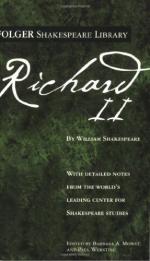|
This section contains 5,790 words (approx. 20 pages at 300 words per page) |

|
SOURCE: Jacobs, Henry E. “Prophecy and Ideology in Shakespeare's Richard II.” South Atlantic Review 51, no. 1 (January 1986): 3-17.
In the following essay, Jacobs traces Shakespeare's shift from medieval to Renaissance political ideologies in Richard II.
Though Justice against Fate complain, And plead the antient Rights in vain: But those do hold or break As Men are strong or weak. Nature that hateth emptiness, Allows of penetration less: And therefore must make room Where greater Spirits come.
(Marvell, “An Horatian Ode,” 37-44)
It is a commonplace to observe that Shakespeare's Richard II traces out a fundamental shift in the nature of kingship and the justification of rule.1 This movement, which reflects both Tudor perspectives on history and Elizabethan political theory, signifies the transition from a medieval to a Renaissance concept of kingship and power. In this theoretical matrix, Richard II plays the role of the unsuccessful medieval monarch while Bolingbroke...
|
This section contains 5,790 words (approx. 20 pages at 300 words per page) |

|


